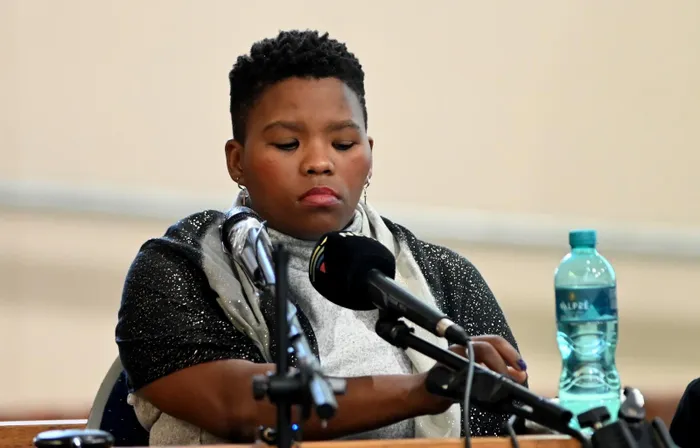Judge questions State's evidence in Joshlin Smith trial

Lourentia ‘Renz’ Lombaard
Image: Ayanda Ndamane/Independent Newspapers
Tensions peaked in the Western Cape High Court on Tuesday as Judge Nathan Erasmus pressed the State on key contradictions in the case of six-year-old Joshlin Smith’s disappearance.
While the prosecution insists there was a deliberate agreement to sell the child, Erasmus raised concerns about misalignments between the star witness’s evidence and that of the accused.
At the centre of the storm is Lourentia ‘Renz’ Lombaard, a Section 204 witness who confessed to her role in the events surrounding Joshlin’s vanishing on February 19, 2024, but has been granted immunity in exchange for full disclosure.
Her testimony forms the backbone of the State’s case, alleging that Joshlin’s mom, Racquel ‘Kelly’ Smith, conspired with Jacquen ‘Boeta’ Appollis, and Steveno ‘Steffie’ van Rhyn to sell Joshlin for R20 000, a plan supposedly conceived months before it was executed.
However, Judge Erasmus signalled unease about accepting Lombaard’s version in full.
He noted a key inconsistency: while Lombaard testified that she witnessed Smith personally handing Joshlin over to a person in a white VW Polo, the accused, Boeta and Steveno, instead referred to delivering the child to a woman named Maka Lima.
“How do I deal with that?” Erasmus asked the State. “If I can’t find that (car handover) to be beyond a reasonable doubt, then we are sitting with the discussion on Sunday, February 18, 2024, and the reason for the action to be taken.”
In response, Advocate Zelda Swanepoel for the State argued that the exact handover mechanism, whether at a car or a house, was not central to proving the crime.
“Whether she was put in a VW Polo or handed over (elsewhere), there was an agreement for the sale of Joshlin and she was delivered,” Swanepoel insisted.
She reminded the court that corroboration exists in multiple layers, even if not every detail aligns.
Six-year-old Joshlin, from Middelpos in Saldanha Bay, was reported missing on February 19.
According to testimony, her mother left her in the care of Boeta, her partner, while she went to work at Carlin Zeegers’ house.
Boeta said he watched over the child, and during the interrogation, he told the police that he and Steveno went to deliver the child to Maka Lima.
Steveno insisted he was asked to “come along” without knowing the full plan of handing the child to Maka Lima. Yet, both made damning admissions in later statements and interviews.
He acknowledged returning to Maka Lima’s home to collect his “cut” of R5000, while Appollis described the incident as a “verruiling vir die kind” (exchange for the child), referencing the R20 000 allegedly promised.
But it’s the relationship between Boeta and Smith that the State argues is key. Advocate Swanepoel painted the relationship as abusive and toxic, alleging that Smith’s motive to sell Joshlin was rooted in personal and familial frustration.
“This was not a happy life,” Swanepoel said. “She was in a destructive relationship and saw no way out. That frustration with her family, also echoed by Mr Nico Steven Coetzee’s testimony, fed into the motive.”
Judge Erasmus, however, is still weighing whether enough independent corroboration exists to accept Lombaard’s account in full.
“Can I infer that (Van Rhyn) knew what the deal was?” the judge pondered. “He’s not saying he was unaware of what it was.”
The State remains firm that even if certain details differ, such as the precise handover location, the core facts hold. They argue that all three accused were involved, that the child was exchanged, and that the inconsistencies are natural in cases where co-conspirators may try to shield themselves or each other.
Judgment is expected to be handed down this week as the trial nears its conclusion.
Cape Times